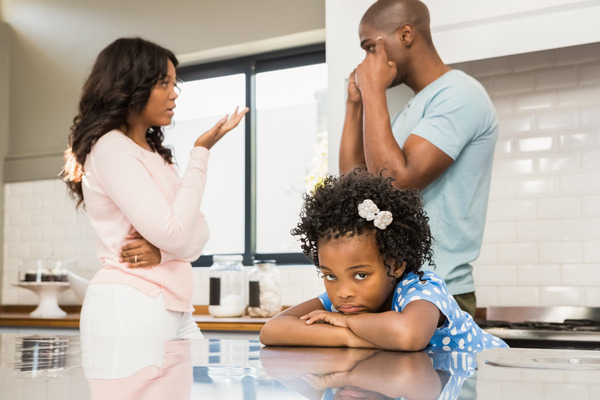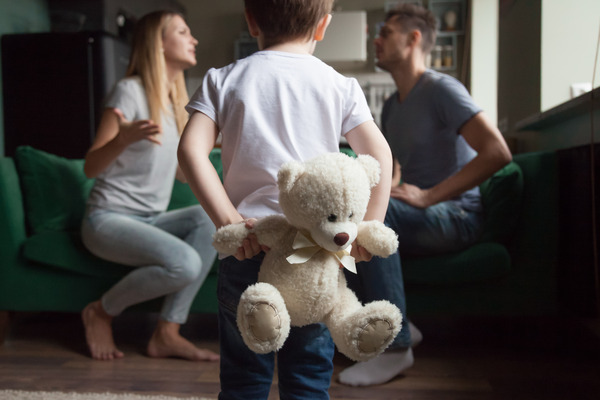Are you going through a divorce process with children? Don’t you know how to communicate your marital separation to your children? Discover the best method to do it according to psychology.
One of the reasons why many broken couples stay together is the existence of common children. Concern about the possible psychological consequences that may leave a divorce with children leads to continuing a coexistence without love and without common projects.
However, the experience with families in the process of separation or divorce has shown that sometimes divorce affects minors much less than is thought, with the presence of quarrels between their parents being much more harmful to children, and the high level of conflict and tension that surrounds the pre-divorce stage. .
In fact, in some situations where family tension and the intensity of the conflict are unsustainable and unbearable, a separation with children It can even be a relief for minors, even if unconsciously. After separation or divorce, both children and parents may experience difficulties in various areas of their lives. However, there is empirical evidence that shows that children should not fall within the risk group for emotional, psychological, family, school or social maladjustment if:
- The breakup of the couple is carried out without leading to family breakdown
- Parents remain psychologically balanced
- Parents carry out their parental work responsibly.
Divorce with children: How to communicate it?
One of the concerns of parents in the process of marital or couple separation It is how and when to communicate the decision to the children. Although minors have different levels of understanding and different ways of adapting to the changes caused by divorce, in the various stages of their development, in general we can establish some basic guidelines:
- Communicate it when it is a firm decision: It is important to inform the children and it is important to communicate the decision of the separation with children when it is taken, never before. Sometimes people need time to think about a decision as difficult as this and perhaps we are going through a relationship crisis that can be overcome by working together. In many cases, it may be a good idea to see a couples therapist.
- Do it together : The decision of the separation or divorce It should be communicated by both parents jointly to the children. If this is not possible, both parents will communicate the decision to the children separately, trying to offer the same version and trying not to blame the other. In both situations, both the father and the mother must seek an attitude of respect towards the other, not blaming anyone and trying to avoid anger, sadness or crying in front of the minors.

- Failure to report underlying conflicts: It does not benefit your children nor do they need to know the intimate details that have led to the separation of your marriage or relationship. The desire and need of some fathers/mothers for their children to “know the whole truth” responds more to a need of the parents themselves who are in the process of acceptance and that sometimes responds to a desire to harm the ex (“your mother/father no longer loves us”, “your father/mother leaves us for…”)
- Inform what reality will be like after the separation: Explain that you have decided to stop living together and that the children have nothing to do with the decision. Who will leave home, how and when they will communicate and relate to the parent with whom they do not live, whether or not they will change schools… It is vital that they compile all the steps to get divorced and tell them to their children to so they can be aware of what will happen in the future.
- Tell the truth: Do not encourage fantasies by lying about the reality of the separation and creating a fictitious situation in the couple: situations such as telling the children that their mother/father is working in another city and that is why they no longer live with them harms their adaptation to the new life. reality of minors and can cause feelings of abandonment, among other problems. Therefore, the most important thing you should keep in mind when separating with children is precisely that you should always tell the reality of this situation.
- Understand your feelings: It is important that during a divorce with children you are understanding of the feelings of the minors. It is understandable that they get angry or sad about it, so it is vital to understand and give them space to process these emotions.
- Inform according to age of the children:
- Children under 5 years old: At this age they do not need excessively long and detailed explanations. It is important to explain that nothing bad is going to happen to the parent who leaves home and to talk about the new place where he or she will reside. It is vital that your divorce be amicable as much as possible so that the little ones do not suffer with this process.
- Children between 5 and 8 years old: They need to know what will happen to him (with whom and where he will live, whether or not he will change schools…) and how it will affect his usual routines. Very important, convey the security that his parents will continue to take care of him despite the divorce process
- Minors between 9 and 12 years old: Immaturity leads them to think in terms of good or bad, right-wrong. They may blame one partner for the family breakdown or think that they are being asked to take sides. At this age, strong bonds are formed with the figure of the same sex and they develop their sexual identity, which is why it is essential to guarantee continuity in the relationship with the other parent. during this separation or divorce with minor children
On many occasions a separation with children It can make little ones feel confused about their feelings. Therefore, if you see that your son or daughter cannot manage these emotions, it is vital that you go to a professional psychologist to help them with it.
How can a separation or divorce affect children psychologically?
A divorce process with children It can cause certain havoc on the mental health of minors. According to psychologists, the most common effects are the following.
- Mental health problems: Regardless of how old your child is during the divorce process , little ones can experience a lot of sadness or anxiety about it. According to studies, rates of depression and anxiety are higher in children of parents who have divorced.

- Behavior problems: In many cases, a marital separation with children can lead the child to experience various behavioral disorders due to not knowing how to manage these negative emotions well. Furthermore, it has been perceived that there are cases in which children have more conflicts with their peers after the divorce of his parents
- Poor academic performance : Children of parents who have divorced do not usually perform in the same way as before. marital separation process In fact, there are many cases in which children of divorced parents tend to have problems in their academic results.
- Risk behaviors: Minor adolescents who have experienced a marital separation They are more likely to engage in risky behavior, whether it is substance use or initiating sexual activity earlier.
It is common for parents to not know what to do to separating with minor children For this reason, it may be interesting to consult with a professional psychologist to find the ideal method to cause the least harm to all those involved.









